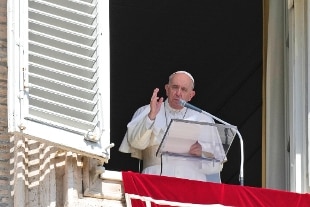Share
by Tiziana Di Giovannandrea
19 September 2021 The Pontiff, commenting on the page of today's Gospel during the Angelus in St. Peter's Square, invited the faithful to ask themselves questions, from the point of view of the Gospel passage of the day, according to which the value of a person is not it is measured by the role it plays, by the success, by the bank account but by the service.
Even if today the word 'service' appears a bit faded, worn out by use.
"Dear brothers and sisters, questioned by the Gospel, let us ask ourselves some questions: I, who follow Jesus, am I interested in who is most neglected? Or, like the disciples that day, do I go in search of personal gratifications? I understand life as a competition for make room for myself at the expense of others or do I think that excelling means serving? And, concretely: do I dedicate time to some 'little one', to a person who does not have the means to reciprocate? Friends? May the Virgin Mary, humble servant of the Lord, help us to understand that serving does not diminish us, but makes us grow. And that there is more joy in giving than in receiving "Pope Bergoglio stated.
For Pope Francis,
he excels when he serves a poor person
not as much as you have. The evangelical logic "inaugurates a reversal" also in the thinking of man and society because "it overturns the criteria that mark what really matters. The value of a person no longer depends on the role he plays, on the success he has, on the work he does. it carries out, from the money in the bank; no, greatness and success, in the eyes of God, have a different yardstick: they are measured on service. Not on what you have, but on what you give ". Commenting on the Gospel passage proposed to the faithful in today's Sunday liturgy, Francis then said: "Do you want to excel? Serve. Today - he immediately added - the word 'service' appears a little faded, worn out by use. But in the Gospel it has a precise and concrete meaning. To serve is not an expression of courtesy: it is to do like Jesus,who, summing up his life in a few words, said he came 'not to be served, but to serve'. Therefore, if we want to follow Jesus, we must follow the path that he himself traced, the
way of service
. Our fidelity to the Lord depends on our willingness to serve ". An attitude, that of service, which according to the Pope"
often costs
,
'tastes like the cross'
", but it certainly brings man closer to God." As care and availability towards others grow, we become freer within, more like Jesus. - the Pontiff told the faithful - The more we serve, the more we feel the presence of God . Especially when we serve those who do not have to give us back, the poor, embracing their difficulties and needs with tender compassion: there we discover that we in turn are loved and embraced by God "." Here is first of all who to serve: those who need to receive and do not have to be returned. - Francis invited to do - By welcoming those who are on the margins, neglected, we welcome Jesus, because He is there. And in a little one, in a poor man whom we serve, we too receive the tender embrace of God ".
At the end of the Marian prayer, Pope Francis addressed his thoughts to all those who have been affected by the
strong floods in
Mexico
. "I am close to the victims of the flood that occurred in the state of Hidalgo, Mexico, especially the sick who died in the hospital in Tula and their families". The Pontiff then prayed for
people unjustly detained in foreign countries
:
"I wish to assure my prayers to the people who are unjustly detained in foreign countries. Unfortunately, there are various cases with different and sometimes complex causes. I hope that in the dutiful fulfillment of justice these people will be able to return to their homeland as soon as possible".
Finally, Pope Bergoglio recalled the
apparition of Our Lady in La Salette
: "My thoughts go to all those gathered at the Shrine of La Salette, in France, in remembrance of the 175th anniversary of the apparition of Our Lady, who showed herself in tears to two boys. Mary's tears make us think of Jesus' tears over Jerusalem and his anguish in Gethsemane. They are a reflection of Christ's pain for our sins and an ever timely appeal to entrust ourselves to God's mercy ".

